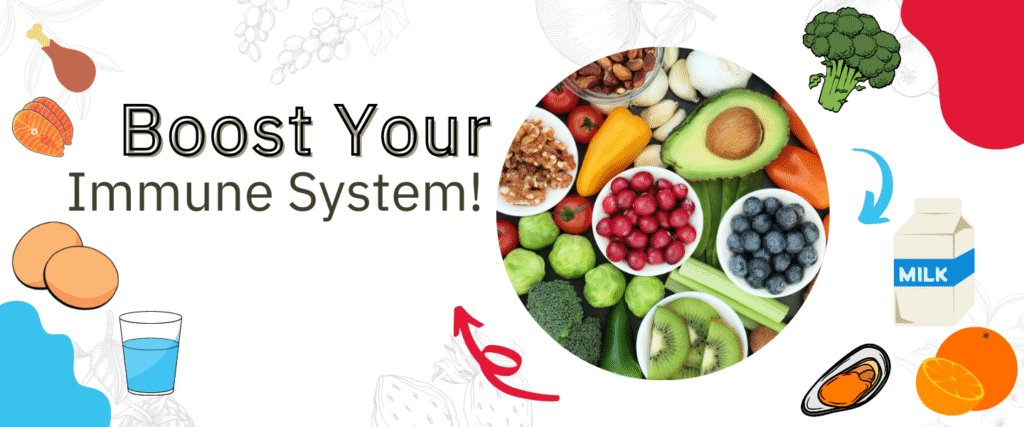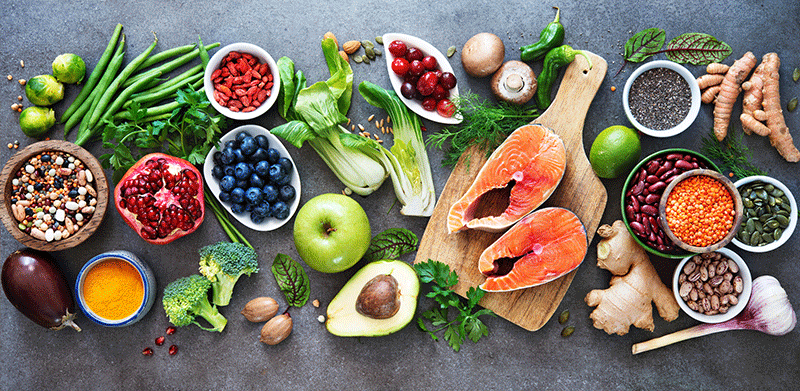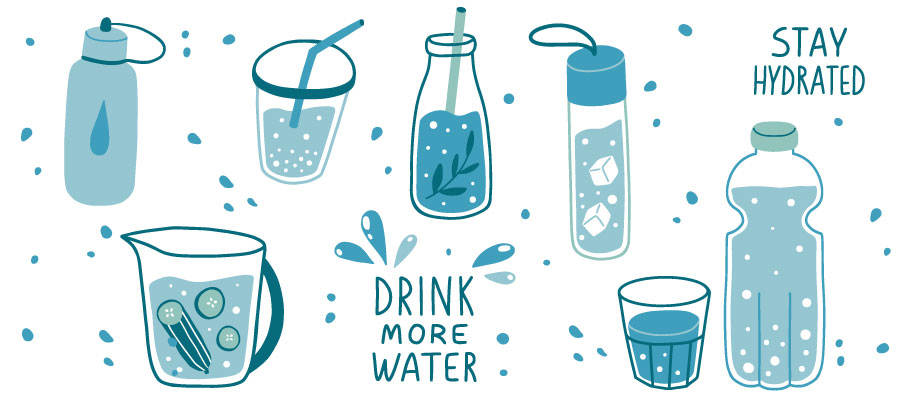
A strong immune system depends on consistent healthy habits—balanced nutrition, quality sleep, hydration, exercise, and stress control. These actions strengthen your body’s defenses, improve recovery, and protect against infection, supporting long-term health and resilience naturally.
Key Takeaways
- Immune system defends against infections through white blood cells, antibodies, and lymphatic functions.
- Nutrient-rich diet with vitamins C, D, E, zinc, and selenium strengthens immune response.
- Gut health, hydration, and consistent physical activity support balanced immunity.
- Managing stress, quality sleep, and outdoor exposure enhance immune performance.
- Avoid smoking, excess alcohol, and processed foods to prevent immune suppression.
- Vaccinations and hygiene are vital for sustained protection and immune readiness.
Understanding the Immune System
Your immune system is your body’s natural defense against infections, viruses, and harmful substances. It is a complex network made up of organs, tissues, cells, and proteins that work together to protect you from illness.
Key Components of the Immune System
Your immune system is made up of several important parts that each play a unique role in protecting your body from illness and infection.
- White Blood Cells: These are the body’s main defenders. They search for signs of infection and attack germs directly.
- Lymphatic System: This is a network of vessels and nodes that carries immune cells throughout your body and helps remove waste and toxins.
- Bone Marrow: This soft tissue inside your bones produces new blood cells, including many types of immune cells.
- Thymus and Spleen: These organs help produce and train immune cells, making sure they can identify and attack threats.
- Antibodies: Special proteins created by your immune system. They recognize specific germs and help your body remember them in the future.
How the Immune System Works
The immune system protects your body by using a series of coordinated steps to detect, respond to, and remember harmful invaders like viruses and bacteria.
- Detection: The immune system looks for anything that shouldn’t be in your body.
- Response: Once a threat is found, immune cells attack and work to remove it.
- Memory: After fighting off an infection, your immune system remembers the invader so it can respond faster if it comes back.
10 Natural Ways to Boost Immune System
A strong immune system helps your body fight infections, recover faster, and maintain everyday health. The following are ten science-backed ways you can naturally support your immune system. Each method is easy to incorporate into your daily routine, and together they create a powerful approach to lifelong wellness.
1. Prioritize Quality Sleep

Quality sleep is essential for a healthy immune system. When you get enough sleep, your body releases proteins that fight infection and inflammation, helping you stay resilient against illness.
- Aim for 7 to 9 hours of sleep every night: Adults usually need this amount. Teenagers and children often require even more for full recovery and repair.
- Stick to a consistent sleep schedule: Go to bed and wake up at the same time each day to help regulate your body’s natural rhythms.
- Limit screens before bed: Blue light from phones or computers can interfere with the hormone melatonin, which helps you fall asleep.
- Create a restful environment: A cool, quiet, and dark bedroom makes it easier to fall and stay asleep.
2. Eat a Nutrient-Rich Diet

The foods you eat have a direct impact on your immune strength. Focus on a wide range of whole foods to provide your body with everything it needs.
- Eat plenty of fruits and vegetables: Colorful produce like citrus, bell peppers, broccoli, spinach, and berries is high in vitamins and antioxidants.
- Include whole grains and legumes: Foods such as oats, quinoa, beans, and lentils offer fiber and important B vitamins.
- Add healthy fats and lean proteins: Include avocados, nuts, seeds, olive oil, fish, and poultry to help cells function properly.
- Use herbs and spices: Garlic, ginger, turmeric, and green tea are natural sources of compounds that support immune defenses.
3. Focus on Key Vitamins and Minerals
Certain nutrients play special roles in helping your immune system work at its best. You can get most of these from your daily meals.
- Vitamin C: Important for white blood cell function. Found in oranges, strawberries, kiwi, bell peppers, and broccoli.
- Vitamin D: Helps regulate immunity. Sources include sunlight, fortified foods, eggs, and fatty fish. Supplements may help in areas with little sun.
- Zinc: Needed for immune cell growth. Get zinc from nuts, seeds, whole grains, and shellfish.
- Vitamin E: An antioxidant found in nuts, seeds, spinach, and sunflower oil.
- Selenium: Supports immune response. Brazil nuts, seafood, and eggs are good options.
4. Support Gut Health
A healthy gut is crucial for strong immunity. The beneficial bacteria in your digestive system help your body recognize and fight harmful invaders.
- Eat probiotic-rich foods: Yogurt with live cultures, kefir, sauerkraut, kimchi, and miso introduce good bacteria.
- Choose prebiotic foods: Bananas, onions, garlic, leeks, asparagus, and oats feed beneficial bacteria.
- Limit processed foods and added sugars: Too much processed food can upset the balance in your gut and increase inflammation.
5. Stay Hydrated

Good hydration keeps your immune system working smoothly. Water supports nutrient transport and helps flush out toxins.
- Drink at least 8 cups (2 liters) of water a day: Adjust based on your activity level and climate.
- Include water-rich foods: Cucumbers, oranges, melons, and tomatoes also help keep you hydrated.
- Limit sugary drinks and excess caffeine: These can contribute to dehydration and add unnecessary calories.
6. Exercise Regularly
Physical activity helps immune cells move more efficiently through the body, making it easier to detect and fight infections.
- Aim for at least 150 minutes of moderate activity per week: Walking, cycling, swimming, or dancing are all effective.
- Include strength training: Lifting weights or using resistance bands twice a week keeps muscles and metabolism healthy.
- Stay consistent: Daily activity is more important than intensity when it comes to immune benefits.
7. Manage Stress Effectively
Chronic stress raises hormones that can weaken your immune system. Actively managing stress keeps your defenses strong.
- Practice mindfulness or meditation: Even a few minutes daily can lower stress.
- Stay connected with others: Social interactions, even virtually, boost both mood and immunity.
- Find enjoyable activities: Hobbies, music, art, or time in nature all help reduce stress.
- Prioritize relaxation and downtime: Don’t overcommit yourself and take breaks when needed.
8. Get Outside and Embrace Nature
Spending time outdoors supports immune health by exposing you to a variety of natural microbes and reducing stress.
- Spend time in parks, gardens, or green spaces: Short walks outdoors can have a positive effect.
- Let children play in the dirt: Early exposure to different microbes helps develop healthy immune responses.
- Have indoor plants or pets: They bring beneficial microbes into your home environment.
9. Avoid Harmful Habits
Certain habits can weaken your immune system, even if you’re doing everything else right. Avoiding these is crucial.
- Avoid smoking: Tobacco damages immune cells and raises infection risk.
- Limit alcohol intake: Heavy drinking suppresses immunity and leaves you more open to illness.
- Maintain a healthy weight: Both obesity and being underweight can reduce immune function. Balanced eating and activity help maintain a healthy weight.
10. Stay Up to Date with Vaccines

Vaccines are a key way to train your immune system to recognize and fight off specific illnesses before you get sick.
- Get recommended vaccinations: Annual flu shots, COVID-19 boosters, and other vaccines as advised protect you and those around you.
- Keep a record of your vaccines: Staying current is important for personal and public health.
Best Foods for Immune Health
Choosing the right foods can provide your immune system with powerful nutrients to help defend your body against illness. The table below highlights some of the top foods and how they support immune health.
| Food | Key Nutrients & Compounds | Immune Benefit |
| Citrus Fruits | Vitamin C | Increases white blood cell production; antioxidants. |
| Red Bell Peppers | Vitamin C, beta-carotene | More vitamin C than oranges; supports skin and eyes. |
| Broccoli | Vitamins A, C, E; fiber, antioxidants | Strengthens immune defense and reduces inflammation. |
| Garlic | Sulfur compounds (allicin) | Antimicrobial; may fight infection. |
| Ginger | Gingerol, antioxidants | Reduces inflammation and may help sore throat. |
| Spinach/Leafy Greens | Vitamin C, beta-carotene, folate | Enhances infection-fighting, antioxidant. |
| Yogurt (with live cultures) | Probiotics, Vitamin D | Supports gut and immune health. |
| Almonds/Nuts | Vitamin E, healthy fats | Antioxidant and supports immune cell function. |
| Sunflower Seeds | Vitamin E, B6, selenium, magnesium | Boosts immune system and regulates immune responses. |
| Turmeric | Curcumin, antioxidants | Anti-inflammatory and may modulate immune cells. |
| Green Tea | Flavonoids (EGCG) | Antioxidant, may support immune function. |
| Berries | Vitamin C, antioxidants | Protect cells, support overall immune health. |
Conclusion
Building a strong immune system starts with healthy daily habits. Quality sleep, balanced nutrition, and key vitamins give your body strength to fight illness. Supporting gut health, staying hydrated, and regular exercise all boost your immune response. Managing stress and spending time outdoors help maintain immune balance, while avoiding smoking and excess alcohol reduces risk. Keeping up with recommended vaccines prepares your body to handle infections.
Foods like citrus fruits, leafy greens, garlic, and yogurt supply powerful nutrients. Each part of the immune system works together, making these lifestyle choices essential for ongoing protection and overall well-being.
FAQs
1. Can vitamin C prevent colds?
Vitamin C cannot guarantee you won’t get a cold, but regular intake can shorten how long symptoms last and may reduce severity.
2. How much sleep do I need for strong immunity?
Most adults need 7 to 9 hours of sleep per night for optimal immune health.
3. Should I take immune-boosting supplements daily?
Supplements can help if you have a deficiency. It’s best to get nutrients from food unless your healthcare provider recommends otherwise.
4. Why is gut health important for immunity?
A healthy gut contains beneficial bacteria that communicate with your immune system, helping it identify and fight off harmful invaders.
5. Can exercising too much weaken my immune system?
Yes, intense or prolonged exercise without enough rest can suppress your immune system. Balance is key.
6. How does stress affect my risk of illness?
Chronic stress raises cortisol, which can lower your body’s ability to fight infection and increase inflammation.
7. Does getting outside really help the immune system?
Yes, exposure to natural environments and outdoor microbes helps balance and train your immune system.
8. Are vaccines necessary if I am healthy?
Yes, vaccines prepare your immune system to fight specific infections more effectively, protecting both you and others.
9. What are the best foods for immune health?
Focus on colorful fruits and vegetables, whole grains, lean proteins, nuts, seeds, and probiotic-rich foods.
10. How quickly will these lifestyle changes make a difference?
Some benefits, like better sleep or less stress, can be felt in days or weeks. Others, like improved gut health or nutrient status, may take longer but offer long-term protection.
Reference
- Medical News Today. (2018). Foods that boost immunity. https://www.medicalnewstoday.com/articles/322412
- MrMed. (2023). Top 10 ways to improve immune system. https://www.mrmed.in/health-library/health-care/top-10-ways-to-improve-immune-system
- Healthline. (2023). Foods that boost the immune system. https://www.healthline.com/health/food-nutrition/foods-that-boost-the-immune-system
- Riverside Medical Clinic. (2023). 10 ways to boost your immune system. https://www.riversidemedicalclinic.com/10-ways-to-boost-your-immune-system/
- National Center for Biotechnology Information. (2023). Immune function and nutrition. https://pmc.ncbi.nlm.nih.gov/articles/PMC10143734/
- Stamford Health. (2023). How to boost your immune system naturally. https://www.stamfordhealth.org/healthflash-blog/infectious-disease/how-to-boost-immune-system-naturally/
- Brown Health. (2023). Foods that boost your immune system. https://www.brownhealth.org/be-well/foods-boost-your-immune-system
- CareCredit. (2023). How to boost your immune system. https://www.carecredit.com/well-u/health-wellness/how-to-boost-your-immune-system/
- Houston Methodist. (2020). 5 ways to boost your immune system. https://www.houstonmethodist.org/blog/articles/2020/mar/5-ways-to-boost-your-immune-system/
Autum Harkins is a CNS with an MS in Clinical Nutrition from Maryland University of Integrative Health (2017) and 8 years in integrative clinics. She develops individualized protocols for deficiencies, digestive health, and women’s wellness, prioritizing third-party-tested supplements. Autum contributes to case series and webinars and mentors practitioners on lab interpretation. Credentials: CNS Board (ANA/BCNS) number, state nutrition licensure where applicable, and professional memberships with links.


